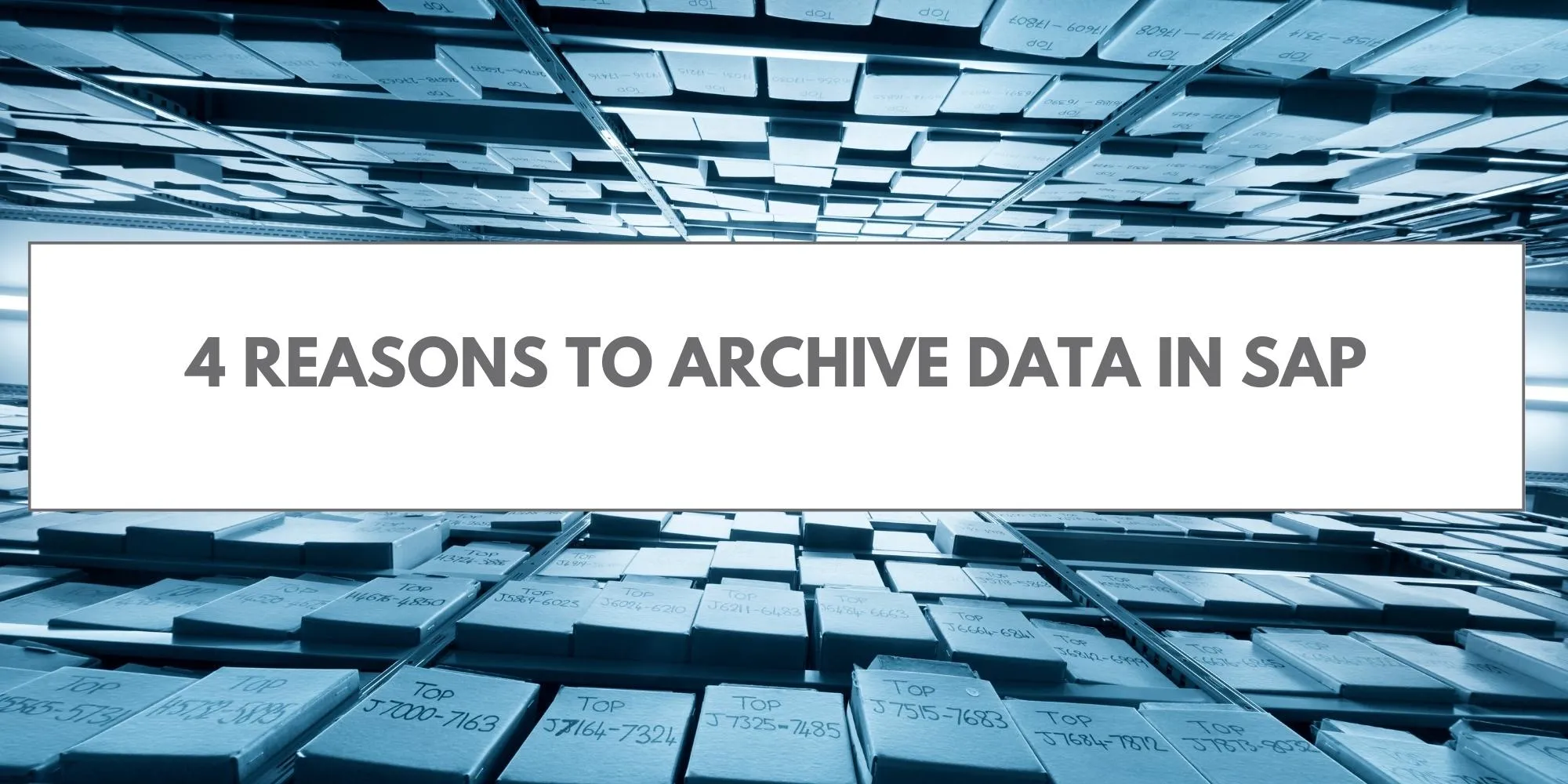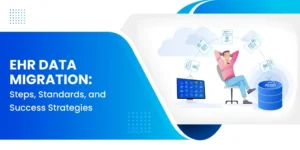Innovative companies and out-of-the-box thinkers are leading digital transformations that have changed how we operate and run our businesses. Data has become the new currency—something you can leverage to set you apart from your competitors or a powerful asset that can bring your company to its knees.
But the sheer volume of data organizations generate and store from day-to-day operations and through mergers and acquisitions has overwhelmed even the most efficient businesses. And as you accumulate more data, your maintenance, management, licensing, and storage fees skyrocket. Performance suffers, too.
SAP data archiving frees up space for new data and helps balance performance with cost. Read on to learn more.
Why SAP data archival important?
Data is non-negotiable—we need it to run our businesses, comply with laws and regulations, and make more intelligent decisions. But there is such a thing as too much data, and its implications could cost you.
- You collect hundreds of millions of records, continually adding to existing data. And while this data is valuable, it slows down SAP and causes performance issues
- Keeping decades-old data takes up space and can contribute to the over-preservation that could put you at financial or legal risk
- The licensing fees and robust infrastructure needed to process your growing volume of data only increase as your data does.
“Over the next five years up to 2025, global data creation is projected to grow to more than 180 zettabytes.” –Statista
But archiving the millions of obsolete or rarely accessed records and data in your SAP ERP system can help remedy these issues.
An effective SAP archival strategy can help remedy these issues.
4 Benefits of SAP data archival
You can recognize quite a few benefits as you free up space in SAP by archiving your data, like:
- Improved efficiency and better performance
- Compliance with industry laws and regulations
- Cost-effectiveness
- Simplified S/4 HANA migration using ILM
Less waiting, more data-driven decision-making
You have hundreds of millions of records and data in your SAP system, rarely accessing most of them. Your data sits there, accumulating. But that data also impacts your system response, run, and downtime—slowing you down, too.
You work hard to lead a high-performing team; your database should be equally efficient. When you need to identify trends or leverage data to make intelligent business decisions, waiting around for the system to retrieve what you need or hoping the system is up and running isn’t an option.
Instead of dealing with slow response times and poor performance due to high volumes of transaction data, archive non-essential data and conduct the crucial data discovery you need—fast.
Imagine quickly accessing vital data within the SAP database or reducing downtime during system updates and backups. Archiving data no longer critical to business operations is the answer. SAP data archival frees up space in the database, and with less data to manage, you:
- Speed up the retrieval process
- Boost performance (the bigger the database, the slower the response time)
- Allow your team to be more efficient with administrative and data management tasks
And you can make the data-driven decisions you need to innovate and move the business forward—without delay.
Greater peace of mind, less risk
Do you follow specific data retention periods set by your data management team? These retention periods outline how long you need to retain data according to laws and regulations and help protect your organization from potential risks and liabilities, specifically with over-preserving historical data.
By archiving your historical data, you:
- Ensure your data is available for auditing and complies with industry regulations.
- Move data not critical to running your business to free up in-memory space in SAP.
- Reduce risks associated with keeping data longer than required by law.
- Understand what you need to keep and when you can defensibly delete your data.
- Avoid penalties for violating compliance laws, like voided contracts, payments for damages, and fines.
Every industry has unique data laws and regulations organizations must follow, including how long you need to retain data, where you can store it, and who can access the data. For example, some companies may need to comply with HIPPA laws while others need to adhere to GDPR.
Archiving your historical data helps you follow best practices and remain compliant with regulations—it also protects you from storing data too long and opening yourself up to liabilities and risks. You likely don’t need records from the 1990s. But if you have them and someone sues your company, that data could be detrimental.
More money in your pocket
Your data is vital to your day-to-day operations and staying compliant with regulations. It helps you identify trends, glean customer insights, and, ultimately, make better business decisions. But it’s also expensive.
SAP data archiving helps put more money back into your business in a few ways, including reducing your storage requirements in SAP. You can archive business-complete or infrequently accessed data in a more cost-effective database, like Archon Data Store. And with regular archiving, you can decrease your total cost of ownership. Less data in SAP (in-memory), the less you pay.
Once you move your data into an archive system, you free up tier 1 storage—space for time-sensitive or volatile data that you need to access quickly. It helps you avoid purchasing even more costly storage to address your data growth. Your storage database should have storage tiers, too, that help reduce costs.
As your data grows, your costs balloon—from storage fees and infrastructure to licensing fees and the hardware needed to process high volumes of data. SAP data archival process decreases the volume of data in the system, which lowers every other cost you incur.
- Your licensing fees decrease as the amount of data in SAP drops.
- There’s no need for as big or powerful processors as you lessen your data volume.
- You don’t need to add to your infrastructure to meet growing data needs.
Realizing cost savings from SAP data archival allows you to direct funds to other high-priority projects or innovate the solutions that keep your business competitive.
An easier S/4 HANA migration
An SAP data archival strategy is crucial to a successful S/4 HANA migration. And that strategy starts with archiving your non-essential data so you only migrate the data you need. As you reduce your data footprint before the migration, you simplify the process and avoid costs by moving only necessary data.
After you archive the data in SAP, you can create a repeatable archiving framework in S/4 HANA that guides every future migration. But if you don’t have an archival strategy or need help implementing one, Platform 3 Solutions is here to help.
Platform 3 Solutions’ approach to SAP data archiving
Whether you’re prepping for an S/4 HANA migration or want to optimize your SAP database for cost savings and performance, our objective approach to SAP archiving will help get you there.
We tailor our strategy to your unique needs and provide:
- A cohesive plan based on your current data sets and archiving solutions
- Recommendations based on which solution will fit your SAP environment best
- Discovery and operational support
- An evaluation of your existing strategies and maturity
Ready to archive? Our four-step approach to archiving projects ensures you address everything from compliance and costs to any challenges you have.
Our 4-step process
At Platform 3 Solutions, we focused on building a thorough SAP data archival process to ensure your project is successful. We have accounted for everything to ensure no surprises and that you get the most value from archiving SAP data
- Phase 1: Initiation
- Phase 2: Archive solution implementation
- Phase 3: Requirements or blueprint
- Phase 4: Archive execution
As we work together moving through these phases, we examine your processes and how we can optimize them and focus on weaving best practices throughout every step. We help you define clear policies for what to archive, retention, regulatory review, and more.
Ready for SAP data archival?
You know you need data to run your business and make smarter decisions. But you also know how costly it can be or how it can slow down SAP and your business if you have too much data.
So, what’s the solution? Archive your SAP data. And if you need help getting started or a strategic partner to guide you from start to finish, contact our team. We’re here to help.
Platform 3 Solutions is a global leader in end-to-end legacy application migration and retirement solutions. Platform 3 empowers secure and seamless transitions of data and applications, eliminates technology debt, and delivers the ROI to invest in technology modernization.



